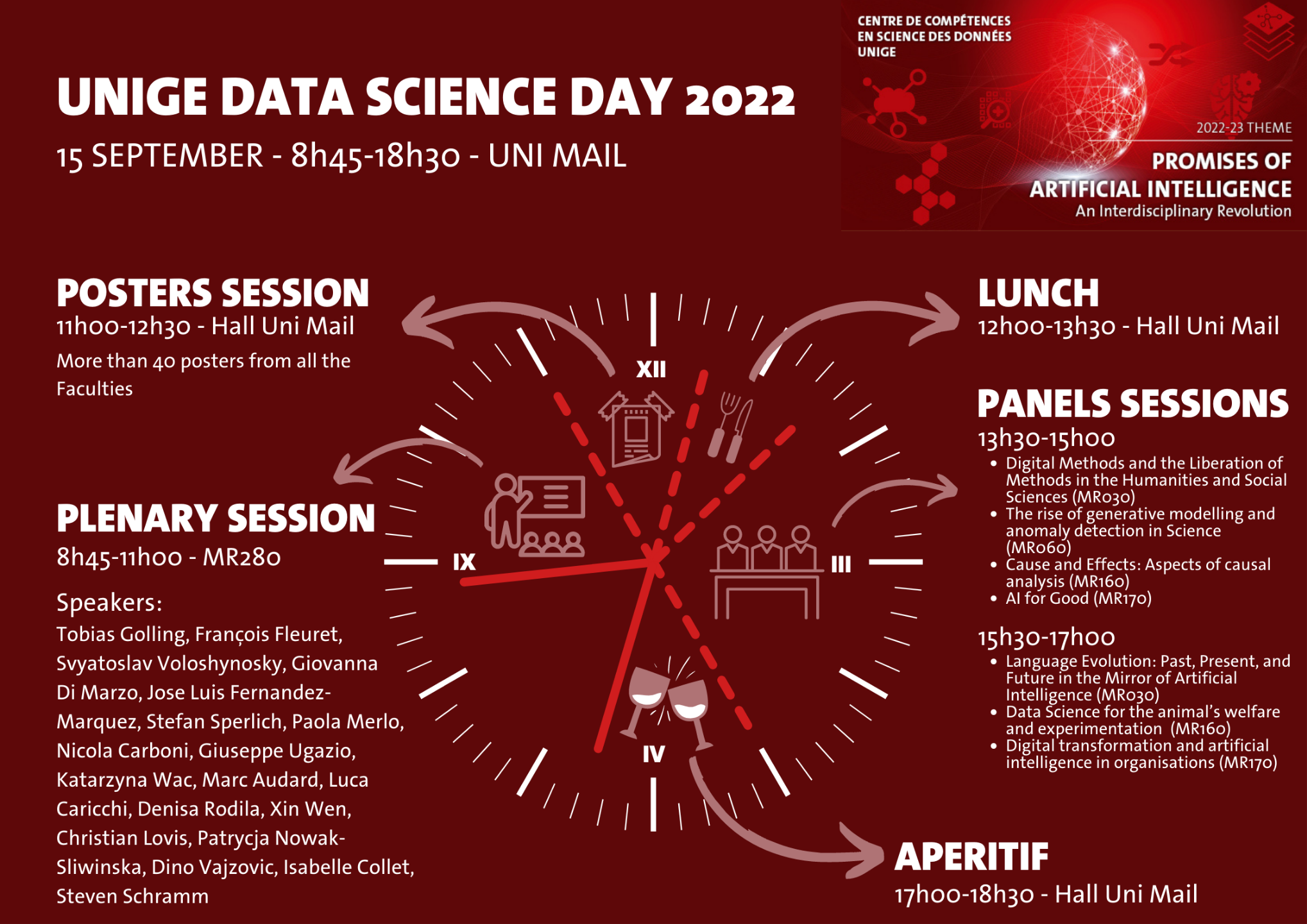UNIGE Data Science Day 2022
Le UNIGE Data Science Day est un colloque scientifique à destination des chercheurs et chercheuses de l’UNIGE, qui se déroule en début d'année académique.
Chaque année, le CCSD anime une réflexion collective sur l’approfondissement d’une thématique particulière. Cette réflexion est introduite lors du UNIGE Data Science Day et poursuivit dans le cadre d'autres activités lancées par le Centre. Véritable fil rouge, cette thématique se veut assez précise pour favoriser une contribution scientifique significative et un dialogue riche, mais également assez transversale pour permettre l’interdisciplinarité.
Pour son édition 2022, le thème du Data Science Day est «Promises of Artificial Intelligence: An Interdisciplinary Revolution».
Cette rencontre se déroulera le 15 septembre 2022 de 8h45 à 18h30 à Uni Mail.
Programme

Plus de précisions sur le programme plus bas
Thematique 2022 : Les promesses de l'IA
L’intelligence artificielle (IA) est synonyme des plus grandes promesses, comme des plus grands défis pour l’humanité. Objet d’imaginaire et de fantasme, de nombreuses œuvres populaires s’en sont saisies bien avant son avènement, projetant les avenirs dystopiques et utopiques, de ce que pourrait devenir un monde régi par une intelligence supérieure, qui dépasserait les capacités de son créateur. Aujourd’hui, l’IA a quitté le domaine de la seule projection intellectuelle pour faire partie intégrante du paysage de l’ère numérique. On la retrouve désormais au détour d’un site internet d’achat en ligne, d’une application de reconnaissance faciale, ou d’une fenêtre ouverte sur les réseaux sociaux. La convergence d’une amélioration continue de la puissance de calcul des machines et de l’accroissement considérable des données informatiques désormais disponibles a en effet rendu cette transformation possible, en offrant les capacités d’entraîner des ordinateurs pour leur permettre d’apprendre et donc de développer une intelligence qui leur soit propre. Dans les sciences, ces nouvelles capacités offrent tant de possibilités d’exploration et de traitement rapides des données qu’elles peuvent être vues comme une véritable révolution, porteuse de grandes promesses.
Pour cette troisième édition du UNIGE Data Science Day, le Centre de compétence en science des données de l’Université de Genève (CCSD) invite les chercheurs et chercheuses de l’Université de Genève à prendre part à une journée d’étude interdisciplinaire sur l’intelligence artificielle et ses diverses applications scientifiques. Cette rencontre se tiendra le 15 septembre 2022 à Uni Mail. Afin d’embrasser toute la diversité des travaux sur ce thème menés à l’UNIGE, cette journée sera articulée autour de trois dimensions de l’IA:
- l’IA et les connaissances fondamentales sur lesquelles s’appuie son développement,
- l’IA comme outil appliqué dans le cadre d’un nombre grandissant de recherches, et
- l’IA comme objet de recherche en soi, qu’il s’agit d’approcher de manière critique.
Au sein du premier axe, le CCSD invite ainsi les chercheurs et chercheuses de l’UNIGE travaillant sur le développement de l’IA à un niveau fondamental à venir présenter leurs travaux. Qu’il s’agisse de la création d’architectures d’intelligence artificielle, de l’amélioration d’algorithmes d’apprentissage-machine ou de perfectionnement des outils techniques utilisés, ces travaux fondamentaux, menés notamment en sciences informatiques et sciences statistiques, sont les bienvenus. Pour le deuxième axe, le CCSD invite les chercheurs et chercheuses de l’UNIGE a venir présenter les multiples applications de l’intelligence artificielle dans le cadre de leur recherche, que cela soit en ayant recours à des techniques de traitement d’images, de textes, de sons, de graphes …, à des fins de classification, de catégorisation ou de prédiction. Finalement, pour le troisième axe, ce sont les chercheurs et chercheuses œuvrant à mieux comprendre les conséquences sociales, politiques, économiques, légales et éthiques de l’avènement de l’IA et de son utilisation grandissante dans la société et dans les milieux scientifiques, qui sont invité-es à venir faire état de leurs travaux.
A l’issue de la journée d’étude du 15 septembre 2022, le CCSD et le Scientific Computing Support (SciCoS) lanceront un appel conjoint à projets pour un fonds d’impulsion octroyant un financement d’une année d’une valeur de CHF 20'000.- au meilleur projet interdisciplinaire sur le thème de l’IA.
programme détaillé
8h45-9h00: Introduction (salle MR280)
Visionnez les interventions >>
9h00-11h00: Session plénière "Promises of AI: An Interdisciplinary Revolution" (salle MR280)
Visionnez les interventions >>
